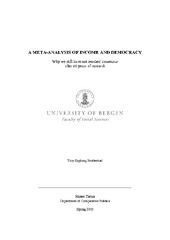A meta-analysis of income and democracy. Why we still have not reached consensus after 60 years of research
Master thesis
Published version
Permanent lenke
https://hdl.handle.net/1956/10238Utgivelsesdato
2015-06-02Metadata
Vis full innførselSamlinger
Sammendrag
The purpose of this study is to examine the relationship between per capita income and democracy. Namely, do increases in income per capita affect a regime's level of democracy? The scholarly tradition has investigated this question over many years, and what we have learned about the actual association between these variables remains inconclusive. As opposed to producing yet another empirical analysis of this hypothesized relationship, this thesis sets forth to examine it via a new methodological approach. Applying the tools of meta-regression analysis to 33 individual empirical studies that investigate the relationship between income and democracy, this thesis finds that income has no statistically significant, quantitatively meaningful effect on democracy (understanding the latter as a graded concept). I also show that there is no theoretical or empirical reason to believe that this field of research is haunted" by publication selection bias. Moreover, I identify a variety of systematic differences between these studies, i.e. study heterogeneity, which explain why it is the case that after 60 years of research we still have not reached a consensus.
